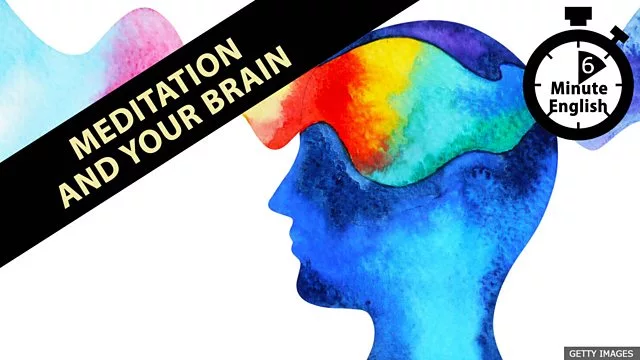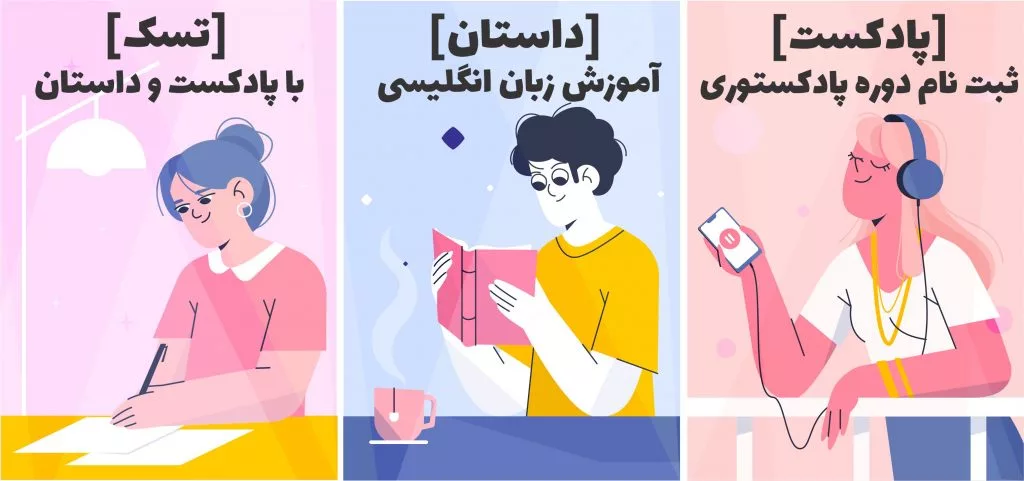پادکست انگلیسی BBC – مدیتیشن
مدیتیشن میتونه ذهن رو عوض کنه، البته از نظر برخی کارشناس ها. نظر شما درباره ی تاثیرات مدیتیشن چیه؟ تا حالا انجامش دادین؟ و اگه آره، فایده ای هم داشته؟ (نظر خودتون رو به انگلیسی در بخش دیدگاه با ما در میون بذارید!) در پادکست انگلیسی BBC – مدیتیشن می شنویم که سم و نیل درباره ی تاثیرات مدیتیشن روی مغر صحبت می کنند و در طول مسیر کلمات جدیدی هم آموزش میدن.
سوال پادکست انگلیسی BBC – مدیتیشن :
Question: What is the meaning of the Tibetan word for ‘meditation’? Is it… a) to relax b) to feel blissful c) to become familiar
[The answer is at the end of the programme.]
به پادکست خوب گوش کن تا جواب رو پیدا کنی.
اگر می خوای گوش دادن به پادکست تا حد امکان برات ساده و کارآمد باشه مراحل زیر را دنبال کن:
هر روز به پادکست گوش کن. وقتی براش یه وقت ثابت در روز در نظر بگیری برات تبدیل به عادت میشه و این عادت هرروز پیشرفت میکنه.
پادکستی رو پیدا کن که موضوعش برات جالب باشه. وقتی از خود موضوع لذت ببری یادگیری هم برات لذتبخش میشه.
به پادکستی گوش کن که transcript یا متن داره. این بهت کمک می کنه تا کلمات و عبارات جدید رو به سرعت در متن پیدا کنی و ساختار انواع مختلف جمله رو خوب یاد بگیری.
پس از گوش دادن به پادکست با متن، در مرحله بعدی سعی کن بدون نگاه کردن به متن این کار رو انجام بدی. این کار مهارت شنیداری رو تقویت می کنه و کمک می کنه تا انگلیسی زبانان بومی را راحت تر درک کنی، حتی اگر خیلی سریع صحبت کنن.
اگه به پادکست انگلیسی گوش کردی و نتونستی کامل متوجه اش بشی، ناامید نشو. پادکست هایESL -English as Second Language بیشماری وجود دارن که برای سطوح مختلف، از ابتدایی تا پیشرفته طراحی شدن. مطمئنا هر روز می تونین یه پادکست مناسب با سطح خودت پیدا کنی.
فراموش نکن که هرچی بیشتر تمرین کنی در اون مهارت رشد میکنی! به قول انگلیسی ها: Practice makes perfect
واژگان کلیدی پادکست انگلیسی BBC - مدیتیشن
| معنی به فارسی | معنی به انگلیسی | واژه |
| علوم اعصاب | science concerning the workings of the nervous system and brain | neuroscience |
| رحم و شفقت - دلسوزی | attitude wishing everyone to be free from all physical and mental suffering | compassion |
| یک جرقه در ذهن و فهمیدن موضوعی که تا به حال نمیدانستید | a sudden moment of understanding something previously not understood; also known as an Aha! moment | a flash of insight |
| توانایی مغز در بازسازی مسیرهای عصبی خود در پاسخ به یک فعالیت هدفمند | the brain’s ability to restructure its neural, electrical pathways in response to purposeful activity | neuroplasticity |
| مدارهای مغزی | groups of interconnected neurons that perform a specific function when activated | brain circuits |
| ماندگار | lasting over a long period of time | enduring |
BBC 6 minute English -Meditation and the brain

متن پادکست انگلیسی BBC - مدیتیشن
Neil
Hello. This is 6 Minute English from BBC Learning English. I’m Neil.
Sam
And I’m Sam.
Neil
How do you relax, Sam?
Sam
Well, I love watching movies and I go swimming.
Neil
One thing that millions of people around the world do is meditate to relax and that’s the subject of our programme. We’ll be looking at experiments by scientists in the US into the Buddhist practice of meditation. We’ll find out how Tibetan monks use meditation techniques to focus better and manage their emotions.
Sam
But what exactly is meditation? People just sitting cross-legged on the floor, thinking of nothing?!
Neil
There’s a lot more to it than that. After all, Buddhist meditation is an ancient practice – even science, according to some. Tibetan Buddhism, as embodied by the Dalai Lama, is what many people think of when you mention meditation. Which brings me to my quiz question.
Sam
Which is..?
Neil
What is the meaning of the Tibetan word for ‘meditation’? Is it…
a) to relax
b) to feel blissful
c) to become familiar
Sam
I think it must be either a) to relax, or b) to feel blissful because they sound like positive states of mind. But I’m not sure about calling meditation a ‘science’, Neil. Isn’t it more like a philosophy or a lifestyle?
Neil
Not according to Professor Richard Davidson of the Center for Healthy Minds. He spoke to Alejandra Martins of BBC World Service programme Witness History about his remarkable scientific experiment which proved for the first time that meditation can actually change the brain.
Richard Davidson
When I first met His Holiness the Dalai Lama it was 1972. He challenged me, he said, ‘I understand that you’ve been using tools of modern neuroscience to study anxiety and depression. Why can’t you use those same tools to study kindness and to study compassion?’
Neil
Neuroscience is the scientific study of the workings of the human brain and nervous system. Professor Davidson measured negative mental states like depression, in contrast to positive attitudes such as compassion – that’s the wish for everyone to be free from suffering.
Sam
Right. In his test, Buddhist monks sent out loving thoughts to everyone equally – to friends, enemies and strangers as well as to themselves.
Neil
Compassionate thoughts such as ‘May you be happy and peaceful’, ‘May you not suffer’. And the results were astonishing!
Sam
What did they show, Neil?
Neil
Very high levels of gamma oscillations – now that’s brain waves showing increased connections between different parts of the brain. This is what you or I might experience as a flash of insight – a moment of sudden understanding and clarity. For us, it might last less than a second. But for these experienced Buddhist monks, the gamma waves lasted minutes! Furthermore, as Richard Davidson explains, brain changes as a result of meditation can be long lasting.
Richard Davidson
There is no question at this point in time based upon the current science that has been conducted over the last 10 years, that meditation can change the brain in enduring ways; and the circuits that are involved are multiple, but they include circuits that are important for regulating attention and regulating emotion.
Neil
So, this was proof of neuroplasticity – our brain’s ability to change in response to conscious effort. In other words, the meditating monks were intentionally remoulding their minds in more positive ways!
Sam
And this was possible because the brain circuits – different parts of the brain responsible for different functions – start talking to each other in new ways that created enduring – meaning long-lasting - changes.
Neil
The meditators gained insight into how their minds work. They were more focused and emotionally balanced and less likely to get upset. How cool is that?
Sam
Pretty cool! But these Tibetan monks sound like Buddhas! They spend thousands of hours sitting in meditation. I’ve got to go to work, Neil! What good is meditation to me?
Neil
Well, Sam, in fact the experiment showed that 30 minutes of meditation a day significantly increased feelings of loving kindness in new meditators too!
Sam
OK, maybe I’ll give meditation a go after all. But not before I find out the answer to today’s quiz.
Neil
Yes, I asked you what the Tibetan word for ‘meditation’ meant.
Sam
And I said either a) to relax, or b) to feel blissful. And I’m feeling pretty confident of getting it right this time, Neil.
Neil
Well, Sam, if the answer came to you in a flash of insight then I’m afraid you need more practice because the correct answer is c) to become familiar, in this case with more positive thoughts and emotions.
Sam
You mean emotions like kindness and compassion – the thought wishing everyone to be free from their problems. What other vocabulary did we learn today, Neil?
Neil
Well, it turns out meditation is actually a science. Neuroscience in fact, which is the study of the human brain and nervous system. Meditation experiments proved neuroplasticity - the brain’s ability to restructure.
Sam
By generating and sending out the compassionate wish, ‘May all beings be happy’, Buddhist meditators change their brain circuits – different parts of the brain responsible for different functions. And this is an enduring change, meaning it lasts and increases over a long period of time.
Neil
I must say, Sam, you took it pretty well when you guessed the wrong answer just then.
Sam
Thanks, Neil. I don’t like getting upset, so I’m trying out some breathing meditation! Breathing in the positive, breathing out the negative…
Neil
Join us again soon for another interesting discussion on 6 Minute English from BBC Learning English. Bye for now!
امیدوارم از پادکست انگلیسی BBC - مدیتیشن لذت برده باشید.
گوش دادن به پادکست روش خوبی برای تقویت مهارت شنیداری و هم چنین یادگرفتن کلمات در بستر یک موضوع خاصه که این به تقویت مهارت مکالمه انگلیسی نیز کمک زیادی می کنه.
اگه تو هم از اون آدمهایی هستی که از گوش دادن به پادکست لذت می بره برات یه خبر خوب دارم! آموزشگاه زبان انگلیسی ۲۴talk یه دوره طراحی کرده مبتنی بر پادکست و داستان کوتاه به اسم "پادکستوری - Podcastory". این دوره سعی کرده یادگیری زبان انگلیسی رو مناسب با نیاز و سطح زبان آموز به یه فرایند بسیار مفرح، موثر، سریع و کم هزینه تبدیل کنه.
همین الان می تونی با کلیک روی عکس زیر و ثبت نام در دوره ی آموزش زبان انگلیسی با پادکست و داستان ۲۴talk اولین و مهم ترین قدم رو برای یادگیری زبان انگلیسی برداری. وقت رو از دست نده!








